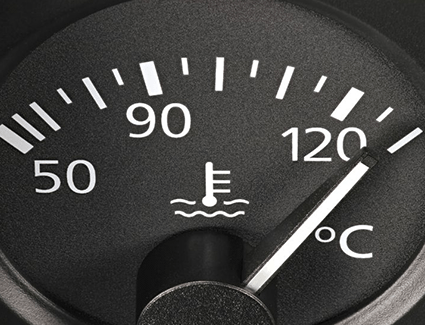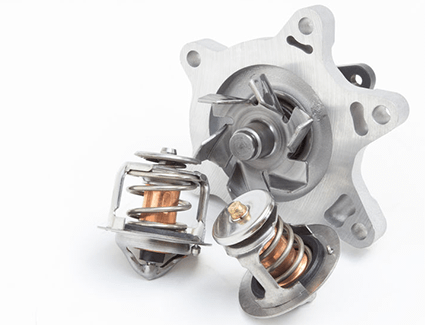Reasons A Car Could Overheat

Your car's engine has a little something in common with Goldilocks -- they both want things not too hot, not too cold, but just right. In fact, an engine that runs too hot can sustain major damage! It can cause metal parts like a cylinder head to warp, can cause seals like head gaskets and piston rings to leak, and even make the engine seize and stop running altogether if it gets hot enough! If your engine has been running too hot, you likely have a failure in the cooling system. Let the team at Archer VW fix this problem in our service center before your engine sustains severe damage. Learn about five of the most common causes of this problem in the information below.


5. Car Overheats When A/C Is On
If you notice that your car starts to run dangerously hot when the A/C is on, but not when the heat is on, that could be a sign of underlying issues like the ones we'll discuss further down this page. When you turn the A/C on in your car, the increased load on the engine can cause the engine to work harder and generate more heat, especially if your A/C compressor is starting to wear out.
So, while running the A/C can exacerbate overheating issues, turning on the heat can actually help reduce the engine's temperature. If the needle starts creeping toward the red, you can help protect the engine as you limp to our service center by turning the heat on full blast. This will pull some heat away from the engine and divert it to the cabin -- buying you a little extra time before the engine gets dangerously hot.
4. Blocked/Damaged Radiator
The radiator is a system of fins situated at the front of your car that allows air to pass over it. To keep the engine cool, coolant flows through the engine itself, absorbing heat. Then, it travels to the radiator, where the fins spread it across a large surface area. The airflow over the radiator draws heat out of the coolant so that it can be recirculated to the engine and start the cycle over again.
If airflow to the radiator is blocked, say by a piece of litter getting stuck in the grille like a plastic bag or sheet of cardboard, that can prevent the radiator from working properly and lead to engine overheating. Furthermore, rust, corrosion and physical damage from an accident can keep the radiator from working its best. You may need to have your radiator replaced if it's no longer exchanging heat as it should.


3. Low/Contaminated Coolant Level
If the radiator itself isn't the culprit, your car could be overheating because of insufficient or contaminated coolant in the system. Also known as antifreeze, engine coolant needs to be at the right level in the cooling system, or it can underperform. If your coolant level is low, that means there could be a leak that needs fixing. Or, if the coolant has collected particles like dirt and rust, it can stop absorbing heat like it should. In that case, you might just need a coolant system flush and fill service to keep your car running at a safe temperature.

2. Failed Water Pump
While water alone is no longer sufficient to cool your car's engine, the pump that pushes coolant through the system is still known as the "water pump," a holdover from back in the day when engines could be cooled with little more than distilled water. This part can become damaged over time by a process called "cavitation." Tiny bubbles can form and collapse inside the water pump with such force that they can cause damage to the impeller fins that push coolant through the system. A damaged water pump will allow the engine to overheat, failing to circulate coolant through the engine. You'll want to have a bad water pump replaced as soon as possible.
1. Stuck Thermostat
Overheating is bad news for any car's engine, but operating at cold temperatures has risks, too. Oil flows more slowly and the engine will burn a rich fuel mixture in an attempt to warm the engine faster, leading to poor fuel economy.
That's why your car's cooling system has a thermostat. It closes to stop the flow of coolant when the engine is just warming up. Then, when the engine is at its ideal operating temperature, coolant flow resumes through the thermostat -- unless it gets stuck. Over time, rust and corrosion can cause a thermostat to go bad, get stuck closed, and keep coolant from flowing at all!
Repairing damage to an overheated engine can be a time-intensive, costly procedure -- but replacing a bad thermostat is typically fast and easy! So be sure to visit our service center as soon as your car starts to run a little hot. Consider getting a tow to our service center if your engine is already running hot, so you can avoid sustaining any more damage. If you have any concerns, we invite you to stop by our service center for a free multi-point inspection of your vehicle.

